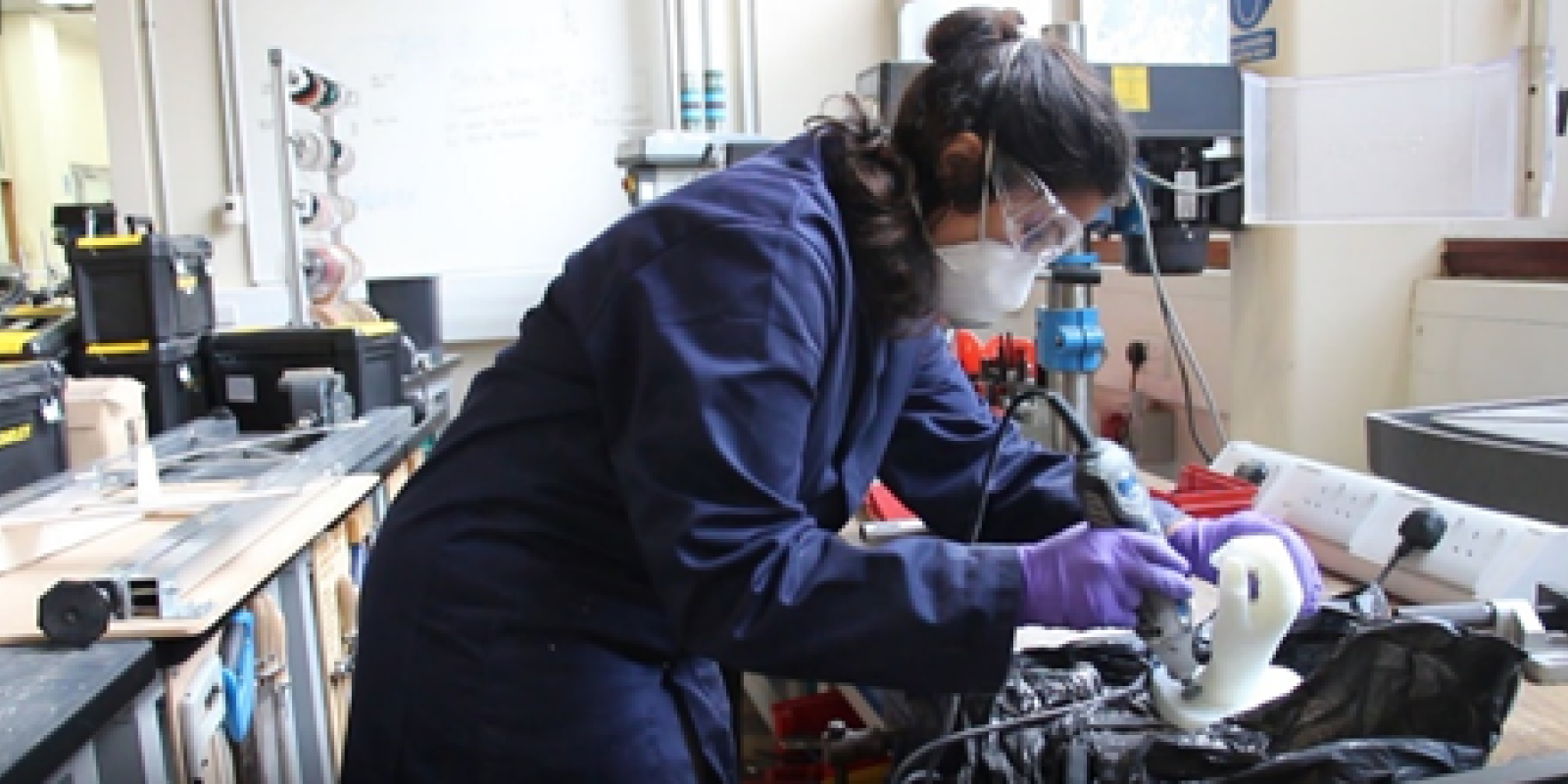
Fresh AUC Graduate Designs Mechanical Engineering Prototype for Healthcare Applications
In Summer 2018, as part of AUC's Undergraduate Research Program, Belquis Haider ’19, mechanical engineering graduate and a recipient of the Tomorrow's Leaders Scholarship, interned with the University of Leeds in the United Kingdom. Working on a research titled HAILO, Haider aimed to develop a product to be used by healthcare providers in the United Kingdom to evaluate the forces between the hand and splints worn by patients suffering from base-of-thumb osteoarthritis — a painful inflammatory condition that affects the joints of around 8.75 million people in the United Kingdom annually and millions of people worldwide. According to the World Health Organization's global estimates, 9.6% of men and 18% of women aged over 60 years old have symptomatic osteoarthritis. WHO also states that 80% of those with osteoarthritis have limitations in movement, and 25% can't perform their major daily activities of life.
Working on the HAILO joint project between Imperial College London, University of Leeds and University of Oxford, Haider — who is now pursuing a European Master of Science in Photonics and Optical Engineering — presented her work at the World Congress for Undergraduate Research in Germany in May 2019, receiving a Research Excellence Award from the University of Leeds in 2018.
Today, through her work with prominent academics and researchers, Haider was able to design, fabricate and program a low-cost functional prototype of the project with 3D printable technology, incorporating the soft-sensing technologies developed at the University of Leeds. She also programmed and integrated a wireless platform to stream the data collected by the sensors to a mobile application for clinical evaluation. This involved an iterative design process, manufacturing of soft sensors, and mechatronic component selection and programming.
"The aim of the project I worked on was the instrumentation of a splint with soft-sensing technology for evaluating the mechanical forces and patient compliance," Haider explained. "This is significant to inform future designs of splints especially that there is no data to justify their use, and this can also lead to a customized patient treatment."
In the early stages of osteoarthritis, splints have been prescribed to limit joint movements and reduce pain, but there is little knowledge about the optimal design of splints, considering how they interact with the patient's hands, and there is also limited data on patient’s compliance with the treatment.
"Sensing technologies is an area that has been of interest to me for a long time due to the ubiquitous nature that lends them useful in various applications," noted Haider.
"As a mechanical engineering student and Tomorrow's Leaders scholar," she added, "my vision has always revolved around innovating and creating technological solutions that can serve society. Our society in the MENA region is in dire need of technological breakthroughs and innovations that are accessible, sustainable and serve existing needs."
Research, Haider affirmed, is the pathway to make such impact. "Research is one thing that I am very passionate about, and from my experience, it is important to bring together people with different specialties and backgrounds to work on differently focused research projects," she said.
"Research is great, and what is even better is sharing it with the world."
And mechanical engineering is no exception. “Many people tend to think of mechanical engineering products as ‘rigid’ or automotive-related. However, looking at global research, it is evident that there are myriad applications that involve soft conforming materials,” said Haider, adding that soft-robotics is an area that has been of interest to her for a long time because of the dexterity that can be imposed onto such structures to make them useful in various applications. "It is a rewarding feeling when you get to share your output with the world and have an impact."
"Belquis Haider was an exemplary undergraduate researcher. She was active in the Mechanical Engineering Department, even in her early freshman and sophomore years. She became an Ambassador for Undergraduate Research, documenting projects taking place in her department, interviewing faculty research mentors, and compiling mechanical engineering research guides and material on methods and theories," said Amani ElShimi, director of undergraduate research, "In her junior and senior years, Belquis participated in the annual conference for Excellence in Undergraduate Research, Entrepreneurship and Creative Achievement (EURECA), applied for grants through the Undergraduate Research Program, and traveled twice for an internship with the Surgical Technologies Research Group at the University of Leeds, England. She engaged in research on rehabilitation mechanisms for both the elbow and the base of the thumb. Her latter research, which introduced mechanisms for osteoarthritis, was presented at both EURECA and the World Congress on Undergraduate Research in Oldenburg, Germany. As an undergraduate student Belquis demonstrated commitment to learning, intentional progressive development of skills, self-immersion in challenging, yet inspiring research experiences, and proud ownership of research outcomes."
Haider reflects on her time at AUC with gratitude, highlighting the importance of research at the University. “I believe that the education and support I received from AUC are what propelled me toward success,” affirmed Haider. "Platforms and events like EURECA at AUC are a great way to present our work and learn about other people’s research and work contributions. Also, the chance of presenting my work at the World Congress for Undergraduate Research in Germany has been an exciting and fulfilling experience, especially as an undergraduate. I hope to see more students engage in research, especially science, technology, engineering, and mathematics because we do need more fresh solutions for global problems in health, energy, sanitation, and climate change — among others — to reduce inequalities.”
Watch Haider talking about her award-winning research during her summer internship at the University of Leeds:
